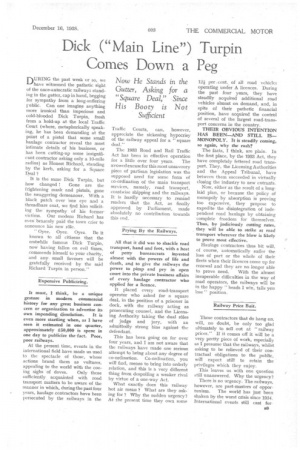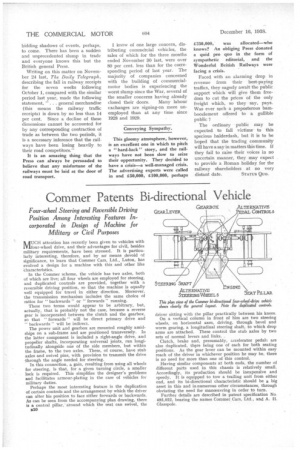Dick ("Main Line") Turpin Comes Down a Peg
Page 43

Page 44

If you've noticed an error in this article please click here to report it so we can fix it.
Now He Stands in the Gutter, Asking for a "Square Deal," Since His Booty is Not Sufficient
DURING the past week or so, we "'have witnessed the pathetic sight of the once-autocratk railways standing in the gutter, cap in hand, begging for sympathy from a long-suffering public. Can one imagine anything more ironical than imperious and cold-blooded Dick Turpin, fresh from a hold-up at the local Traffic Court (where, metaphorically speaking, he has been demanding at the point of a pistol that some small haulage contractor reveal the most intimate details of his business, or has been cutting-up some insignificant contractor asking only a 10-mile radius) as Honest Richard, standing by the kerb, asking for a Square Deal ?
It is the same Dick Turpin, but how changed ! Gone are the frightening mask and pistols, gone the swaggering demeanour. With a black patch over 'one eye and a threadbare coat, we find him soliciting the sympathy of his former victims. Our modern Richard has even brazenly paid the town crier to announce his new role.
" Oyez. Oyez. Oyez. Be it known to all citizens that the erstwhile famous Dick Turpin, now having fallen on evil times, commends himself to your charity, and any small favours will be gratefully received by the said Richard Turpin in person."
Expensive Publicizing.
It must, I think, be a unique gesture in modern commercial history for any great business concern or organization to advertise its own impending dissolution. It is even more startling when, as I have seen it estimated in one quarter, approximately 50',000is spent in one day to publicize the fact. Poor, poor railways.
At the present time, events in the international field have made us used to the spectacle of those, whose actions brand them as vultures, appealing to the work' with the coo ing sighs of doves. Only those sufficiently acquainted with road transport matters to be aware of the manner in which, during the past four years, haulage contractors have been persecuted by the railways in the Traffic Courts, can, however, appreciate the sickening hypocrisy of the railway appeal for a "square deal."
The 1933 Road and Rail Traffic Act has been in effective operation for a little over four years. The avowed excuse for this most unsavoury piece of partisan legislation was the supposed need for some form of co-ordination of the main transport services, namely, road transport, coastwise shipping and the railways. It is hardly necessary to remind readers that the Act, as finally approved. by Parliament, made absolutely no contribution towards this end.
Prying By the Railways.
All that it did was to shackle road transport, hand and foot, with a host of petty bureaucrats inyested almost with the powers of life and death, and to give the railways the power to pimp and pry in open court into the private business affairs of every haulage contractor who applied for a licence.
It placed every road-transport operator who asked for a square deal, in the position of a prisoner in dock, with the railway acting as prosecuting counsel, and the Licensing Authority taking the dual roles of judge and jury, with an admittedly strong bias against the defendant.
This has been going on for over four years, and I am not aware that the railways have made one serious attempt to bring about any degree of co-ordination. Co-ordination, you will find, means to bring into orderly relation, and this is a very different thing from despoiling a weaker rival by virtue of a one-way Act.
What exactly does this railway hot air mean ? What are they asking for ? Why the sudden urgency? At the present time they own some 12i per .cent., of all road vehicles operating under A licences. During the past four years, they have steadily acquired additional road vehicles almost on demand, and, in spite of their pathetic financial position, have acquired the control of several of the largest road-transport concerns in the country.
THEIR OBVIOUS INTENTION HAS BEEN—AND STILL IS— MONOPOLY. It is steadily coming, so again, why the rush?
The facts, I think, are plain. In the first place, by the 1983 Act, they have completely fettered road transport. They, the Licensing Authorities and the Appeal Tribunal, have between them succeeded in virtually closing the industry to new entrants.
Now, either as the result of a longlaid plan, or because the policy of monopoly by absorption is proving too expensive, they propose to expedite the disintegration of independent road haulage by obtaining complete freedom for themselves. Thus, by judiciously cutting rates, they wilt be able to strike at road transport wherever the blow is likely to prove most effective.
Haulage contractors thus bit will, of course, automatically suffer the loss of part or the whole of their fleets when their licences come up for renewal and they are no longer able to prove need. With the almost insuperable difficulties in the way of road operators, the railways will be in the happy "heads I win, tails you lose'' position.
Railway Price Bait.
Those contractors that do hang on, will, no doubt, be only too glad ultimately to sell out at "railway prices." If it comes off it will be a very pretty piece of work, especially as I presume that the railways, whilst asking to he relieved of their contractual obligations to the public, will expect stilt to retain the privileges which they enjoy.
This leaves us with one question still unanswered. Why the urgency?
There is no urgency. The railways, however, are past-masters of opportunism. The world has just been shaken by the worst crisis since 1914. International events still cast for bidding shadows of events, perhaps, to come. There has been a sudden and unprecedented slump in trade and everyone knows this but the British general Press.
Writing on this matter on November 24 last, The Daily Telegraph, describing the fall in railway receipts for the seven weeks following October 1, compared with the similar period last year, made tile following statement, " . . . general merchandise (this means the railway traffic receipts) is down by no less than 14 per cent. Since a decline of these dimensions cannot be accounted for by any corresponding contraction of trade as between the two periods, it is a necessary inference that the railways have been losing heavily to their road competitors."
It is an amazing thing that the Press can always he persuaded to believe that any misfortune of the railways must be laid at the door of road transport. I know of one large concern, distributing commercial vehicles, the sales of which for the three months ended November 30 last, were over 80 per cent. less than for the corresponding period of last year. The majority of companies concerned with the building of commercialmotor bodies is experiencing the worst slump since the War, several of the smaller concerns having already closed their doors. Many labour exchanges are signing-on more unemployed than at any time since 1928 and 1929.
Conveying Sympathy.
This gloomy atmosphere, however, is an excellent one in which to pitch a "hard-luck" story, and the railways have not been slow to seize their opportunity. They decided to have a crisis—a well-managed crisis. The advertising experts were called in and £50,000, £100,000, perhaps £250,000, was allocated—who knows? An obliging Press donated a quid pro quo in the form of sympathetic editorial, and the Wonderful British Railways were facing a crisis.
Faced with an alarming drop in revenue from their best-paying traffics, they eagerly await the public support which will give them freedom to cut the prices of the only freight which, so they say, pays. Was ever snch a preposterous bamboozlement offered to a gullible public ?
The ordinary public may be expected to fall victims to this specious balderdash, but it is to be hoped that the trading community will have a say in matters this time. If they fail to raise their voices in no uncertain manner, they may expect to provide a Roman holiday for the railway shareholders at no very
distant date. STATUS QUO.




























































































